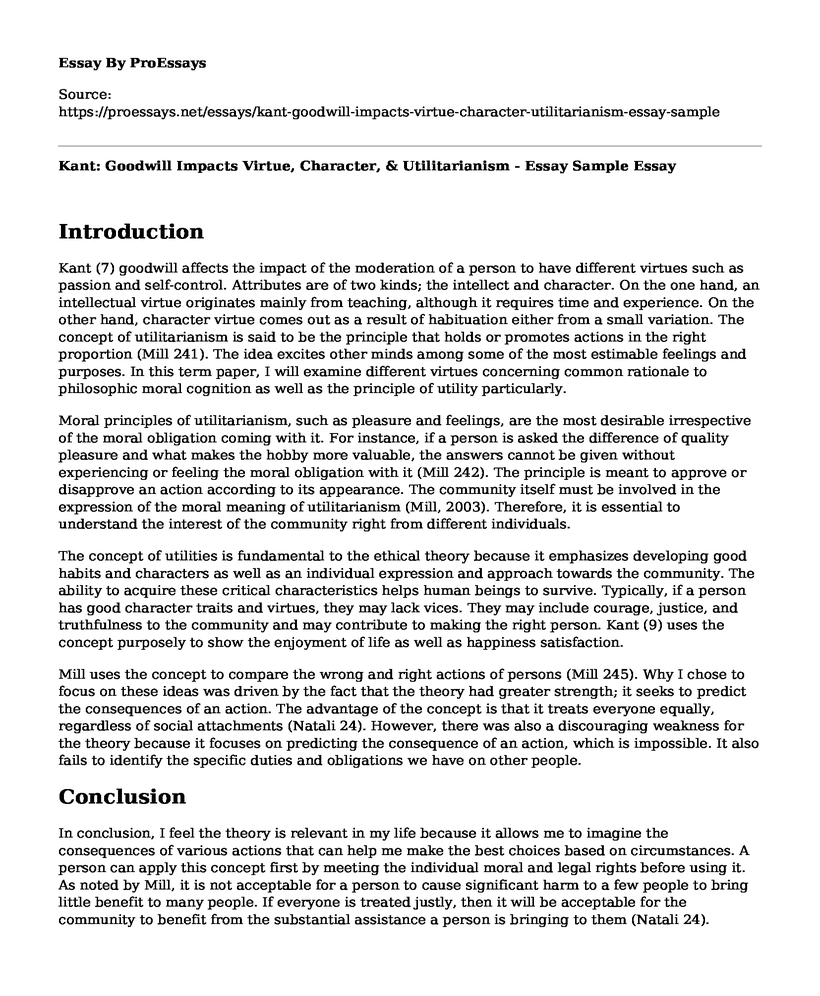Introduction
Kant (7) goodwill affects the impact of the moderation of a person to have different virtues such as passion and self-control. Attributes are of two kinds; the intellect and character. On the one hand, an intellectual virtue originates mainly from teaching, although it requires time and experience. On the other hand, character virtue comes out as a result of habituation either from a small variation. The concept of utilitarianism is said to be the principle that holds or promotes actions in the right proportion (Mill 241). The idea excites other minds among some of the most estimable feelings and purposes. In this term paper, I will examine different virtues concerning common rationale to philosophic moral cognition as well as the principle of utility particularly.
Moral principles of utilitarianism, such as pleasure and feelings, are the most desirable irrespective of the moral obligation coming with it. For instance, if a person is asked the difference of quality pleasure and what makes the hobby more valuable, the answers cannot be given without experiencing or feeling the moral obligation with it (Mill 242). The principle is meant to approve or disapprove an action according to its appearance. The community itself must be involved in the expression of the moral meaning of utilitarianism (Mill, 2003). Therefore, it is essential to understand the interest of the community right from different individuals.
The concept of utilities is fundamental to the ethical theory because it emphasizes developing good habits and characters as well as an individual expression and approach towards the community. The ability to acquire these critical characteristics helps human beings to survive. Typically, if a person has good character traits and virtues, they may lack vices. They may include courage, justice, and truthfulness to the community and may contribute to making the right person. Kant (9) uses the concept purposely to show the enjoyment of life as well as happiness satisfaction.
Mill uses the concept to compare the wrong and right actions of persons (Mill 245). Why I chose to focus on these ideas was driven by the fact that the theory had greater strength; it seeks to predict the consequences of an action. The advantage of the concept is that it treats everyone equally, regardless of social attachments (Natali 24). However, there was also a discouraging weakness for the theory because it focuses on predicting the consequence of an action, which is impossible. It also fails to identify the specific duties and obligations we have on other people.
Conclusion
In conclusion, I feel the theory is relevant in my life because it allows me to imagine the consequences of various actions that can help me make the best choices based on circumstances. A person can apply this concept first by meeting the individual moral and legal rights before using it. As noted by Mill, it is not acceptable for a person to cause significant harm to a few people to bring little benefit to many people. If everyone is treated justly, then it will be acceptable for the community to benefit from the substantial assistance a person is bringing to them (Natali 24). However, I think it is essential for the district to differentiate between happiness and contentment.
Works Cited
Kant, Immanuel. "Groundwork of the Metaphysics of Morals (1785." (1785): 7-33.
Mill, John Stuart, Jeremy Bentham, and John Troyer. The Classical Utilitarians: Bentham and Mill. Hackett Publishing, 2003.
Mill, John Stuart. Utilitarianism. Longmans, Green, and Company (1895): 241-252.
Natali, Carlo, ed. Aristotle's Nicomachean Ethics, Book II, III-IV: Symposium Aristotelicum. Oxford University Press on Demand, (2009): 23-37.
Cite this page
Kant: Goodwill Impacts Virtue, Character, & Utilitarianism - Essay Sample. (2023, Apr 26). Retrieved from https://proessays.net/essays/kant-goodwill-impacts-virtue-character-utilitarianism-essay-sample
If you are the original author of this essay and no longer wish to have it published on the ProEssays website, please click below to request its removal:
- Hume's Moral Philosophy - Essay Example
- Selfishness as an Inert Human Trait Essay Example
- A Persuasive Essay on Free Will
- Ethics in Public Speaking Essay Example
- Essay on Betrayal of the American Dream: Impoverishment of the Middle Class
- Paper Example on Atheism: Culture vs. Divine Morality in the 21st Century
- Article Review Example on Human Services: Improving Quality of Life







